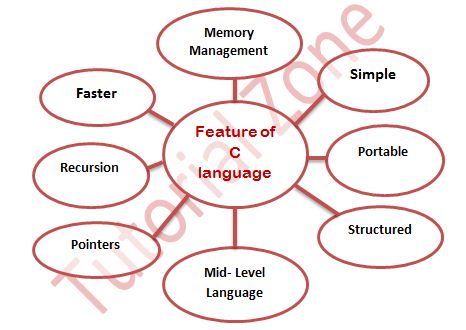Feature of C Language
- It is simple and easy to use.
- Middle-Level Programming Language.
- Structured Programming Language.
- Memory Management.
- Fast Speed.
- Pointers.
- Recursion.
- Extensiable.

Simple
C is a simple language in the sense that it provides a structured approach (to break the problem into parts),
the rich set of library functions, data types, etc.
Machine Independent or Portable.
Unlike assembly language, c programs can be executed on different machines with some machine specific changes.
Therefore, C is a machine independent language.
Mid-level programming language
Although, C is intended to do low-level programming. It is used to develop system applications It also supports
the features of a high-level language. That is why it is known as mid-level language.
Structured programming language
C is a structured programming language in the sense that we can break the program into parts using functions.
So, it is easy to understand and modify. Functions also provide code reusability.
Memory Management
It supports the feature of dynamic memory allocation. In C language, we can free the allocated memory at any time
by calling the free() function.
Fast Speed
The compilation and execution time of C language is fast since there are lesser inbuilt functions and hence
hence the lesser.
Pointers
C provides the feature of pointers. We can directly interact with the memory by using the pointers.
We can use pointers for memory, structures, functions, array, etc.
Recursion
In C, we can call the function within the function. It provides code reusability for every function.
Recursion enables us to use the approach of backtracking.
Extensiable
C language is extensible because it can easily adopt new features.